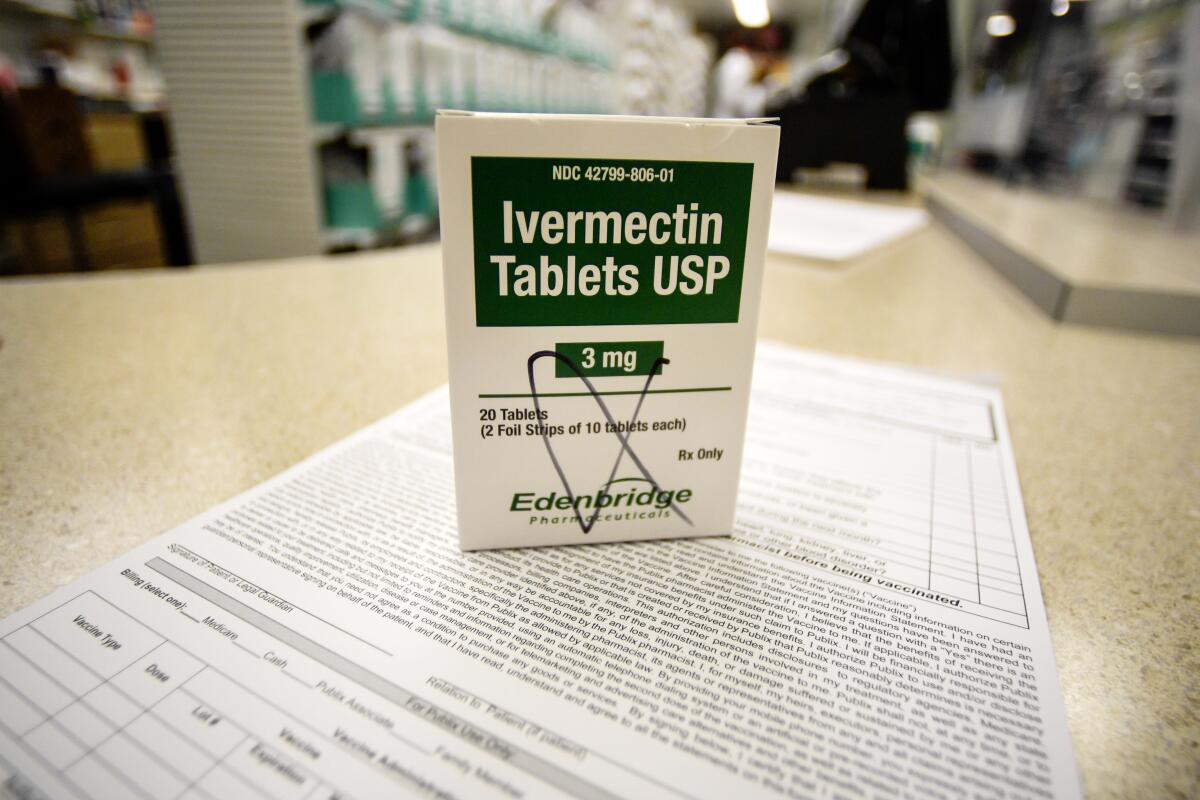Doctors fear California law aimed at COVID-19 misinformation could do more harm than good

California doctors will soon be subject to disciplinary action if they give their patients information about COVID-19 that they know to be false or misleading.
On its face, the new state law sounds like a clear blow to the forces that have fueled skepticism about life-saving vaccines, encouraged anxious people to trust discredited and dangerous drugs like ivermectin and hydroxychloroquine, and reduced face masks to symbols of political partisanship. The measure was signed by Gov. Gavin Newsom last week and goes into effect on Jan. 1.
But critics of the law, including many mainstream doctors who have advocated passionately for masks and vaccines, say it could end up curbing well-intentioned conversations between patients and physicians about a disease that’s still changing from one month to the next.
“There’s clear misinformation that’s happening that’s as black and white as you can get. But there’s a lot of gray out there too,” said Dr. Eric Widera, a professor of medicine at UC San Francisco who specializes in geriatrics.
With COVID-19, he said, “the standard of care has changed a lot in 2½ years.” Earlier in the pandemic, he recorded instructional videos for his children’s school on how to properly wear cloth face masks. Today such masks are largely dismissed as ineffective.
That’s a nonclinical example of a truth about the evolution of medical research, Widera said: “What was misinformation one day is the current scientific thinking another day.”
The new law applies only to conversations between patients and their doctors about the patient’s care. It will not cover, for example, any fringe claims that a COVID-19 skeptic with a medical degree might air on social media or at a public rally. An attempt to limit a physician’s public pontifications would probably not survive a 1st Amendment challenge in court, a legislative analysis of the bill found.
State medical boards are warning doctors not to spread COVID falsehoods, but will that stop them?
In his signing statement, Newsom acknowledged that he was “concerned about the chilling effect” of legislating doctor-patient conversations.
But this law, he wrote, “is narrowly tailored to apply only to those egregious instances in which a licensee is acting with malicious intent or clearly deviating from the required standard of care while interacting directly with a patient under their care.”
The text of the measure doesn’t spell out what constitutes an egregious instance, or what metrics will be used to determine malicious intent.
Investigating and adjudicating an alleged violation by traditional physicians will be the responsibility of the Medical Board of California. The law also applies to osteopathic physicians, and the Osteopathic Medical Board of California will handle those cases. Penalties include probation, suspension and loss of license.
In some ways, the legislation seems more symbolic than substantive. State law already bars doctors from lying to their patients or doling out subpar medical advice that fails to meet the basic standard for quality care. That applies to care for all diseases, including COVID-19.
Medical treatment changes as understanding of a disease evolves, and the board’s grievance process is designed to “accommodate the reality that medicine in general is an ever-changing field,” said Carlos Villatoro, a spokesperson for the state medical board.
When a complaint against a physician comes in, the board “uses physicians who are experts in their field to review the individual facts and circumstances involved in the situation under investigation, and opine on the appropriate standard of care that should have been followed at that time,” Villatoro said. “No two cases are the same, and the Board would make this determination based on the facts and circumstances of the given case.”
By making the prohibition against COVID-19 lies unambiguously clear, the new law will strengthen a medical board’s hand if a physician who has been sanctioned tries to challenge that decision, said state Sen. Richard Pan (D-Sacramento), a pediatrician and co-author of the measure.
How the online wellness community pivoted from juice cleanses and special diets to embracing COVID-19 vaccine skepticism.
This isn’t California’s first law against a specific type of medical misconduct. Over the years, the state Business and Professions Code has been updated to explicitly bar physicians from breaking laws related to human cloning and to the long-discredited cancer treatments laetrile and amygdalin. The code specifies that it’s “unprofessional conduct” to distribute liquid silicone for breast implants, or to fail to give patients written summaries before cosmetic collagen injections.
The code is there to protect patients. Its authors wrote it with the most glaring examples in mind, Pan said, such as Dr. Simone Gold, the Beverly Hills physician who founded the anti-vaccine group America’s Frontline Doctors. Gold has promoted debunked COVID-19 treatments such as the anti-malarial drug hydroxychloroquine and has spread outlandish claims about vaccine safety.
(Gold also participated in the Jan. 6, 2021, attack on the U.S. Capitol and pleaded guilty to unlawfully entering the building. She was sentenced to 60 days in prison and had her medical license suspended after her conviction.)
“When someone blatantly provides misinformation, totally inaccurate information — especially with intention — that harms patients,” Pan said. “That takes away the patient’s ability to make appropriate decisions.”
The new law was endorsed by the California Medical Assn., which represents nearly 50,000 physicians throughout the state. But critics say they are worried that singling out a rapidly evolving and relatively new disease could have unintended harms.
“I am concerned this bill will not take into account how quickly information changes in COVID-19,” said Dr. Monica Gandhi, an infectious disease specialist at UCSF.
She cited as an example the antiviral medication Paxlovid. The Food and Drug Administration’s guidelines for emergency use of the drug aren’t updated fast enough to reflect the latest research showing that while it helps senior citizens, it doesn’t do much for patients under 65.
Researchers map the spread of COVID lies on Facebook.
Dr. Leana Wen, an emergency physician and health policy expert at George Washington University, said it would be easy to imagine a similar law being used to suppress factual medical information.
“We should be very concerned about the chilling effect on medical practice and scientific discourse — and look out for copycat legislation from other states on other issues (i.e. reproductive care) that use politics in an attempt to censor physicians,” Wen said in an email.
It’s not an idle worry. Since the start of the pandemic, 14 states have introduced legislation to protect doctors who spread COVID-19 misinformation from professional censure.
In 2021, the Federation of State Medical Boards warned that doctors who spread misinformation about COVID-19 could place themselves at risk of losing their licenses. When Tennessee’s Board of Medical Examiners attempted to adopt the national FSMB policy as its own, the state legislature threatened to disband the board if it took such an action, the legislative analysis pointed out.
Misinformation around this pandemic has caused deep and irreversible harm. Of the more than 1 million deaths from COVID-19 in the U.S. thus far, as many as 318,000 could have been prevented with available vaccines, according to an analysis from the Brown School of Public Health and others. People have died because they made choices based on false information spread by people in a position to know better.
Both the law’s authors and its critics say their arguments are based on the same notion: Patients should be able to trust their doctors.
“Trust in one’s physician is one of the most important tools we have when talking with patients about the importance of evidence-based interventions like COVID vaccines,” Widera said. If patients are under the impression that their doctors can’t speak freely, he said, “it will only further worsen the ongoing trust issues we have seen in the last 2½ years.”
More to Read
Updates
12:23 p.m. Oct. 6, 2022: This story was updated to include the California Medical Assn.’s position on the new law.










